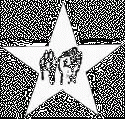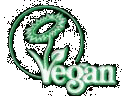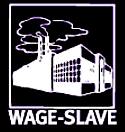
 |
The term vegan first appeared
in the name of the Vegan Society, founded in 1945. It is used for a strictly
vegetarian diet and for a lifestyle which avoids the (ab-)use of any animal products, i.e.
in clothes (leather, wool, silk), food, medicine and "entertainment" (zoo,
circus). Some people don't eat meat, milk, eggs etc. for health reasons, others because of
their ethical attitude or responsibility towards nature (so do I). Vegans won't consider
their behaviour as a sacrifice, but as the last chance to prove wo/men as intelligent
creatures and to prevent us from the further destruction of "our" planet.
Intensive livestock farming causes dangerous harm to earth and water,
it is responsible for erosion, pollution of air and water and the destruction of the rain
forest. Animal tests are ruthless if done for the sake of cosmetic research and useless in
medical terms. The fate of animals in zoos is an example for the perverse cruelty we
commit just to satisfy our own, selfish pleasure.
Not only are animals and land exploited due to the greed for a
nutrition which is unnecessary (and even unhealthy), but the so-called civilized societies
also force people in poor countries to clear land and produce grain for "our"
cattle while the people there are starving to death. The same area which is required to
feed 1 person on a beef basis would provide 5 with protein from vegetables or 9 with
carbohydrate from potatoes; the production of 1 pound of beef swallows 11,200 litres of
water, the same amount of rice only 1,800 litres.
Sometimes it seems hard to be consistent on this path. Just have a
look at the list of ingredients on most of the products in a supermarket; if you don't
understand the single labels this might well be deliberate: e.g. an item labelled
lecithine is obviously more delicious than calling it blood (actually the used lecithine
is of vegetable or synthetic origin in nine out of ten cases - but why can't it be called
so, then?). The only way to be sure what you eat is to get information about what is
hidden behind the so-called E-numbers or the chemical terms. The force on producers to
declare the origin of ingredients is not strong enough in most countries, just look at the
genetic manipulation, but don't we have the right to know what our daily bread consists
of?
There will be hardly anybody who can be called one hundred percent
vegan, but that's not the matter. Being vegan means to open your eyes and to feel
responsible for your companions: men and women, animals and plants. It's just a matter of
attitude (nothing esoteric or crap like that), and sometimes of knowledge. So if you want
to get more precise information on this subject I invite you to read: Kath Clements, Why
Vegan, London: Heretic Books Ltd., 1995 (Vegan, Göttingen: Echo-Verlag, 1996),
or visit one of the websites listed in my links section.
If you are a vegetarian of the ovo-lacto type (i.e. you eat dairy
products and eggs) because you can't stand the atrocities done to our fellow creatures in
the farms, slaughterhouses and during transport, please don't stop half way. Take into
account that calves have to be bred and are murdered for milk (it's a myth that cows
generate milk without having babies, nor is milk essential or even healthy for us) and
that livestock farming with chicken is unbelievably brutal. Vegetarianism is a starting
point, but veganism seems more consistent.
|

 |
Being vegan also implies
to have a critical look at capitalism (by the way, the term capitalism is derived
from cattle). As long as industry tells us lies like we needed meat for a healthy
diet, animal tests were necessary or leather was less polluting than synthetics etc. (the
same goes for the force to buy certain clothes or other products to be "in".) I
feel free to say that capitalism is a more brain-washing than it is a democratic
institution.
I guess it's not reasonable to state a "crisis" or
something like that for capitalism. This would mean that something had gone
wrong. But that's not true: The system itself seems to be wrong.
It might be a utopia to proclaim an anti-capitalistic society with
just wages and an ecologically balanced production system. But if you (or I) don't start
to fight for a fair society, whom else should we blame? A first and probably the most
important step (and an easy one as well) is to boycott products of companies which
obviously violate laws of humanity or animal rights. You needn't feel as an outsider or an
alien if you avoid McDonald's or Procter&Gamble food etc. Quite on the
contrary, you will be able to gain much self-confidence.
All this doesn't mean to live without money at all (nevertheless we
should try and establish communities which are able to live on the base of a non-profit
system). But if the neurotic need for money expands into mass-psychotic trends, as is the
current euphoria for share-holding and the stock market, we mustn't be surprised if the
unemployed start riots before long and throw bricks into our windows or demolish our
beloved cars. Shares kill jobs, so we'll have to wait and see whether such a system is
able to maintain social justice.
|
|
Anarchy seems to
be a utopia, too. I don't think it is impossible at all, but I guess for large societies
the least of all evil is social democracy, maybe socialism (I call it an evil because an
ideal society wouldn't need any form of government, yet this hardly seems possible to
realize).
I can (partially!) understand the views of the hardline
movement, they are vegan, reject drugs, endorse sports etc. (things I do, too), but I
won't share their elitarian attitude towards anarchy.
Peace can be pursued, but not enforced! This, again, is a matter of
consciousness and political awareness, not of blindly following any dogma. Just be
yourself - this is an anarchistic and a democratic slogan. |